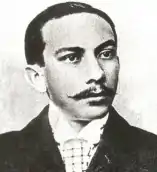Salvador Toscano
Salvador Toscano Barragán (22 March 1872 – 14 April 1947), also known as Salvador Toscano, was a director, producer and distributor of early Mexican cinema films.[1] He was Mexico's first filmmaker.[2][3][4][5][6][7]
Salvador Toscano Barragán | |
|---|---|
 Salvador Toscano, c. 1921 | |
| Born | 22 March 1872 Guadalajara, Jalisco, Mexico |
| Died | 14 April 1947 Mexico City |
| Occupation | Filmmaker and director, producer, distributor of early Mexican films. |
| Known for | First Mexican filmmaker |
Biography
Toscano was born in 1872 in Guadalajara, Jalisco.[1][2] He began studying to become a mining engineer, however changed his career to become a filmmaker.[2][3] He used a Cinematograph camera and projector which was first introduced in France in 1895.[2] It was introduced into Mexico a year later when the first presentation of film in Mexico was made on 15 August 1896.[2][5]
Toscano opened Mexico's first public movie theatre at 17 Jesús María Street in Mexico City in 1897.[2][7][8] In the public theater he showed such famous early films as The Great Train Robbery, A Trip to the Moon, and The Kingdom of the Fairies.[2]
Toscano began his movie career by filming local scenes in Mexico and local news events.[2][3][5] Some early short film titles of these, made in 1896 and 1897, were Men in Scuffle on the Main Square and Rural Police Riding Their Horses.[5]
Toscano began full length production filming in 1898, directing and producing his own movies.[2][3] They were mostly documentaries pertaining to Mexico.[2][3] Toscano was the producer of the first full-length film in Mexico.[2][3][6][7] It was fiction based on the play Don Juan Tenorio.[2][3][4][6][9] The film was made in 1898 starring the Mexican actor Paco Gavilanes.[2][6]
Toscano was a documentary filmmaker mostly however. He filmed on the Mexican Revolution and most of his movie making was on this subject.[2][3]
Toscano had a rival named Enrique Rosas who also produced films in Mexico at the same time.[5] Many movie theaters had been constructed by 1902 in Mexico City and within a few years many more were spread throughout Mexico.[5] Toscano's last film was shot in 1921.[2]
Toscano's daughter Carmen took many scenes of his Mexican revolutionary documentary films and reintroduced it under the title of Memorias de un mexicano (Memoirs of a Mexican) in 1950.[2][3][4][5][10] The scenes were filmed by Toscano between 1897 and 1923. Much of the footage was about President Porfirio Díaz and the revolutionary events of his reign.[2][3][5][7][10] The reintroduced film was 100 minutes long and premiered 24 August 1950.[2][3][5][10]
One of the propaganda "photo-ops" Toscano made of Díaz was called General Díaz on a Stroll Through Chapultepec Park.[5] Toscano also made documentary films of Díaz's grand celebration of Mexico's first one hundred years of independence.[5]
Since 1982 the movie industry of Mexico has awarded the Salvador Toscano Medal in recognition of outstanding contribution to Mexican cinematography.[11]
References
- Lopez, Ana, "Early Cinema and Modernity in Latin America", Cinema Journal, 40.1 (2000), pp. 48–78.
- Michel, Manuel, "Mexican Cinema: A Panoramic View", Film Quarterly, July 1965, Vol. 18, No. 4, pp. 46–55.
- Herbert, Stephen et al., Who's Who in Victorian Cinema: A Worldwide Survey, BFI 1996, ISBN 0-85170-539-1
- Nicholson, Irene, "Mexican Films: Their Past and Their Future", The Quarterly of Film Radio and Television, April 1956, Vol. 10, No. 3, pp. 248–252
External links
Notes
- "Directores del Cine Mexicano: Salvador Toscano". Archived from the original on 2011-05-18. Retrieved 2008-07-17.
- "Salvador Toscano Barragan - Mexico's first filmmaker". Retrieved 2008-07-16.
- "Mexican Cinema". Archived from the original on 2008-03-12. Retrieved 2008-07-16.
- "Movies - Cinema of Mexico". Archived from the original on 2008-07-08. Retrieved 2008-07-16.
- Standish, pp. 120-121
- Bethell, p. 521, The first man in Mexico to make a primitive fiction film was Salvador Toscano Barragan (1872-1941), in 1898, with the first of many film versions of that nineteenth-century romantic staple, "Don Juan Tenorio."
- Raat, p. 35, The father of the Mexican film industry was Salvador Toscano Barragán.
- Noble, p. 59
- Noble, p. 27
- Noble, p. 58-9 and p. 195
- Jaszczak, p. 348
Bibliography
- BETHELL, Leslie, The Cambridge History of Latin America, Cambridge University Press 1995, ISBN 0-521-23225-2
- CIUK, Pearl. (2000). Diccionario de directores del cine mexicano . (2000). Dictionary of directors of Mexican cinema. México: Consejo Nacional para la Cultura y las Artes (CONACULTA) y Cineteca Nacional. Mexico: National Council for Culture and the Arts (Conaculta) and Cineteca Nacional. ISBN 970-18-5590-6
- DÁVALOS Orozco, Federico (1996). Albores del cine mexicano . Davalos Orozco, Federico (1996). Albores of Mexican cinema. ISBN 968-6932-45-3
- JASZCZAK, Sandra, Awards, Honors & Prizes: International and Foreign 1996-97, Gale Group 1996, ISBN 0-8103-9175-9
- NOBLE, Andrea, Mexican national cinema, Routledge 2005, ISBN 0-415-23010-1
- RAAT, Dirk, Twentieth-century Mexico, University of Nebraska Press 1986, ISBN 0-8032-8914-6
- RAMÍREZ, Gabriel (1989). Crónica del cine mudo mexicano . Ramirez, Gabriel (1989). Chronicle of Mexican silent film. ISBN 968-805-416-X
- REYES, Aurelio de los (1983). Cine y sociedad en México 1896-1930: vivir de sueños . Reyes, Aurelio de los (1983). Cinema and society in Mexico 1896-1930: live dreams. Vol. Vol. 1. 1. Universidad Nacional Autonoma de Mexico. ISBN 968-36-3125-8
- STANDISH, Peter et al., Culture and customs of Mexico, Greenwood Publishing Group 2004, ISBN 0-313-30412-2
- VARIOS (1996). Salvador Toscano: 1872-1947. Pionero del cine nacional. Pioneer of national cinema. México: Comité para la Conmemoración de los Cien Años del Cine Mexicano. Mexico: Committee for the Commemoration of the Hundred Years of Mexican Cinema. Folleto del homenaje a Salvador Toscano con motivo del Centenario del Cine Mexicano. Brochure tribute to Salvador Toscano to mark the centenary of the Mexican Cinema.
- VIÑAS, Moisés (1992). Índice cronológico del cine mexicano (1896-1992) . Vine, Moses (1992). Chronological index of Mexican cinema (1896-1992). México: Dirección General de Actividades Cinematográficas de la UNAM. ISBN 968-36-2487-1
